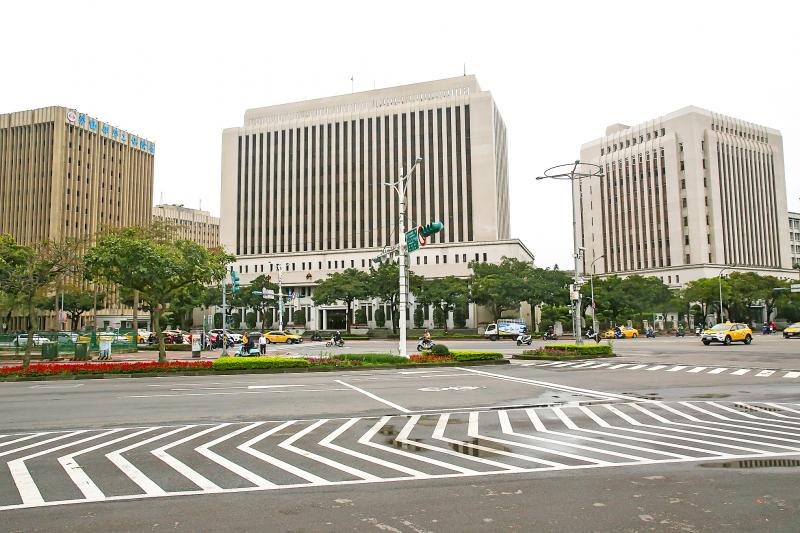The central bank on Sunday issued a rare statement to dismiss claims by Japan’s Nomura Securities Co that six economies, including Taiwan’s, are vulnerable to financial crises over the next three years given rising bubble signs.
Nomura said that its proprietary indicator showed that Taiwan, Germany, Japan, the Netherlands, Sweden and the US are susceptible to financial crises over the next 12 quarters, judging by their ratios of private credit to GDP ratios, debt service ratios, equity prices, property prices and effective foreign-exchange rates.
A Singapore-based research team at Nomura raised the alarm based on Cassandra data modeling, which it said has correctly predicted two-thirds of the past 53 crises in 40 countries since the early 1990s.

Photo: Bloomberg
“The Nomura report is inaccurate regarding Taiwan as it fails to understand that healthy economic fundamentals, rather credit inflation, push up the nation’s five indicators,” the central bank said.
Trade tensions between the US and China, and the ensuing realignment of supply chains, has allowed Taiwanese firms to enjoy order transfers and an increase in bank loans resulting mainly from companies shifting production lines home from China, the central bank added.
The continuation of money printing by major central banks helps drive up property prices in Taiwan, and the central bank has introduced selective credit controls to slow the pace, it said, adding that bad loans from real-estate lending are low.
Although Taiwanese lenders have increased loans to small and medium-sized borrowers to help them manage the pains induced by the COVID-19 pandemic, all loans are covered by the Small and Medium Enterprise Credit Guarantee Fund of Taiwan (信保基金), it added.
The central bank dismissed concerns over asset price bubbles in Taiwan, saying that strong corporate earnings and a bright outlook for exports account for the rallies in the local bourse this year and last year.
The appreciation in the local currency has more to do with export-driven current account surpluses rather than hot money influxes, it said, adding that it would intervene whenever it spots abnormal fund movements that could destabilize the foreign-exchange market.
“Overall, Taiwan is not in danger of having a financial crisis,” the bank said, adding that banks and life insurance companies all report improving profitability and capital adequacy.

South Korea’s equity benchmark yesterday crossed a new milestone just a month after surpassing the once-unthinkable 5,000 mark as surging global memory demand powers the country’s biggest chipmakers. The KOSPI advanced as much as 2.6 percent to a record 6,123, with Samsung Electronics Co and SK Hynix Inc each gaining more than 2 percent. With the benchmark now up 45 percent this year, South Korea’s stock market capitalization has also moved past France’s, following last month’s overtaking of Germany’s. Long overlooked by foreign funds, despite being undervalued, South Korean stocks have now emerged as clear winners in the global market. The so-called “artificial intelligence

‘SEISMIC SHIFT’: The researcher forecast there would be about 1.1 billion mobile shipments this year, down from 1.26 billion the prior year and erasing years of gains The global smartphone market is expected to contract 12.9 percent this year due to the unprecedented memorychip shortage, marking “a crisis like no other,” researcher International Data Corp (IDC) said. The new forecast, a dramatic revision down from earlier estimates, gives the latest accounting of the ongoing memory crunch that is affecting every corner of the electronics industry. The demand for advanced memory to power artificial intelligence (AI) tasks has drained global supply until well into next year and jeopardizes the business model of many smartphone makers. IDC forecast about 1.1 billion mobile shipments this year, down from 1.26 billion the prior

Chinese artificial intelligence (AI) start-up DeepSeek’s (深度求索) latest AI model, set to be released as soon as next week, was trained on Nvidia Corp’s most advanced AI chip, the Blackwell, a senior official of US President Donald Trump’s administration said on Monday, in what could represent a violation of US export controls. The US believes DeepSeek will remove the technical indicators that might reveal its use of American AI chips, the official said, adding that the Blackwells are likely clustered at its data center in Inner Mongolia, an autonomous region of China. The person declined to say how the US government received

People stand in a Pokemon store in Tokyo on Thursday. One of the world highest-grossing franchises is celebrated its 30th anniversary yesterday.